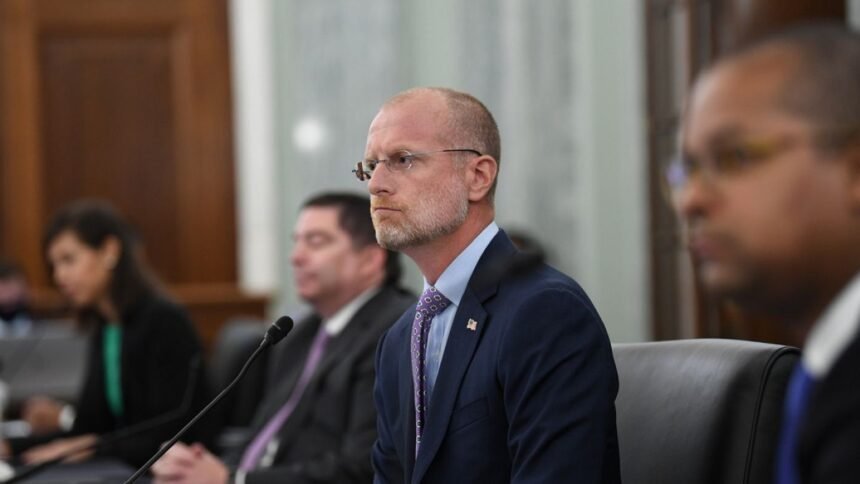ADVERTISEMENT
The stamp of approval from the Federal Communications Commission comes after months of turmoil revolving around President Donald Trump’s legal battle with “60 Minutes,” the crown jewel of Paramount-owned broadcast network CBS.
With the spectre of the Trump administration potentially blocking the hard-fought deal with Skydance, Paramount earlier this month agreed to pay a $16 million (€13.6m) settlement with the president.
Critics of the settlement lambasted it as a veiled bribe to appease Trump, amid rising alarm over editorial independence overall.
Further outrage also emerged after CBS said it was cancelling Stephen Colbert’s “Late Show” just days after the comedian sharply criticised the parent company’s settlement on air. Paramount cited financial reasons, but big names both within and outside the company have questioned those motives.
In a statement accompanying the deal’s approval, FCC Chairman Brendan Carr hailed the merger as an opportunity to bring more balance to “once-storied” CBS.
“Americans no longer trust the legacy national news media to report fully, accurately, and fairly. It is time for a change,” Carr said.
While seeking approval, Skydance management assured regulators that it would carefully watch for any perceived bias at CBS News and hire an ombudsman to review any complaints about fairness. In a Tuesday filing, the company’s general counsel maintained that New Paramount will embody “a diversity of viewpoints across the political and ideological spectrum” — and also noted that it plans to take a “comprehensive review” of CBS to make “any necessary changes.”
The FCC approved the merger by a 2-1 vote, and the regulator who opposed it expressed disdain for how it all came together.
“After months of cowardly capitulation to this administration, Paramount finally got what it wanted,” FCC Commissioner Anna Gomez said in a statement. “Unfortunately, it is the American public who will ultimately pay the price for its actions.” Gomez was appointed by former President Joe Biden.
Paramount and Skydance have said they wanted to seal the deal by this September, and now appear to be on a path to make it happen by then, if not sooner.
Over the past year, the merger has periodically looked like it might fall apart as the two sides haggled over terms. But the two companies finally struck an accord that valued the combined company at $28 billion (€23.8bn), with a consortium led by the family of Skydance founder David Ellison and RedBird Capital agreeing to invest $8 billion.
What is next for Paramount?
Signalling a shakeup would accompany the changing of the guard, Ellison stressed the need to transition into a “tech hybrid” to stay competitive in today’s entertainment landscape. That includes plans to “rebuild” the Paramount+ streaming service, among wider efforts to expand direct-to-consumer offerings in a world with more entertainment options and shorter attention spans.
Ellison, who is poised to become CEO of the restructured Paramount, is the son of Larry Ellison, technology titan and co-founder of Oracle. Besides possessing an estimated $288bn (€245.3bn) fortune, Larry Ellison has been described as a friend by Trump.
Billions and investigations on the path to regulatory approval
While Paramount sweated out regulatory approval of the merger, one of TV’s best-known and longest-running programs turned into a political hot potato when Trump sued CBS over the handling of a “60 Minutes” interview with his Democratic Party opponent in last year’s presidential election, Kamala Harris. Trump accused “60 Minutes” of editing the interview in a deceptive way designed to help Harris win the election. After initially demanding $10bn (€8.5bn) in damages, Trump upped the ante to $20bn (€17bn) while asserting he had suffered “mental anguish.”
The case quickly became a closely-watched test of whether a corporation would back its journalists and stand up to Trump. Editing for brevity’s sake is commonplace in TV journalism and CBS argued Trump’s claims had no merit. But reports of company executives exploring a potential settlement with Trump later piled up, particularly after Carr — appointed to lead the FCC by Trump — launched an investigation earlier this year.
By the start of July, Paramount agreed to pay Trump $16 million (€13.6m). The company said the money would go to Trump’s future presidential library and to pay his legal fees, but maintained that it was not apologising or expressing regret for the story.
Is the editorial independence in question?
Concerns about editorial independence at CBS had piled up even in the months before the deal was announced — with Paramount overseeing “60 Minutes” stories in new ways, as well as journalists at the network expressing frustrations about the changes on an award-winning program that has been a weekly staple for nearly 57 years
In April, then-executive producer of “60 Minutes” Bill Owens resigned — noting that it had “become clear that I would not be allowed to run the show as I have always run it.”
Another domino fell in May when CBS News CEO Wendy McMahon also stepped down, citing disagreements with the company “on the path forward,” amid speculation of Paramount nearing a settlement with Trump. CBS has since appointed Tanya Simon as the top producer at “60 Minutes” — elevating a respected insider in a move that could be viewed as a way to calm nerves leading up to the changes that Skydance’s Ellison is expected to make.







